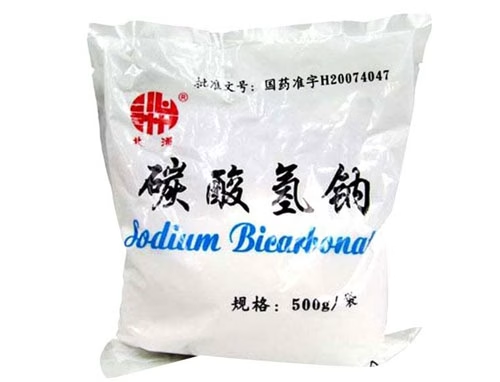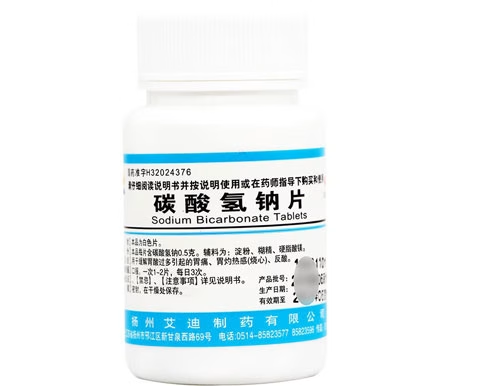I. Introduction
In the complex realm of transplantation medicine, maintaining the health and functionality of the transplanted organ is of utmost importance. One biomarker that has garnered significant attention is alkaline phosphatase (ALP). In transplant patients, elevated levels of alkaline phosphatase can be a cause for concern, as they may indicate potential complications such as organ rejection, biliary obstruction, or other post – transplant pathologies.

On the other hand, sodium bicarbonate tablets, a commonly available over – the – counter medication, have a wide range of uses in medicine. They are well – known for their ability to neutralize stomach acid, treating conditions like heartburn and indigestion.
However, recent research has started to explore some off – label applications of sodium bicarbonate, leading to an interesting question: Can sodium bicarbonate tablets lower alkaline phosphatase in transplant patients?
II. Understanding Alkaline Phosphatase in Transplant Patients
2.1 Normal Reference Intervals of Alkaline Phosphatase
Alkaline phosphatase (ALP) is a group of isoenzymes that play crucial roles in various physiological processes within the human body. This enzymatic activity is essential for many biological functions.
The normal range of ALP levels in the blood can vary depending on the laboratory and the method of measurement. Generally, for adults, the normal reference interval is approximately 45 – 125 U/L for men and 30 – 100 U/L for women aged 20 – 49 years, and 50 – 135 U/L for women aged 50 – 79 years. In children, the normal levels are higher due to their rapid bone growth. During growth spurts, children can have ALP levels that are two to three times higher than those of adults. This is because the increased osteoblastic activity in growing bones leads to more ALP being released into the bloodstream.

2.2 Abnormal Alkaline Phosphatase Levels in Transplant Recipients
In transplant patients, the levels of alkaline phosphatase can deviate from the normal range, and these abnormal levels can have significant implications for the patient’s health.
2.2.1 Causes of Elevated ALP:
- Organ Rejection: One of the most concerning causes of elevated ALP in transplant recipients is organ rejection.
- Biliary Complications: Biliary obstruction is a common post – transplant complication, especially in liver transplant patients.
- Medication – Induced Effects: Some of medications can have adverse effects on the liver and other organs, leading to elevated ALP levels.
- Infection: Infections, especially those affecting the liver or the biliary system, can cause ALP levels to rise.
2.2.2 Health Implications:
- Impact on Organ Function: Persistently elevated ALP levels can be a sign of ongoing damage to the transplanted organ.
- Diagnostic and Prognostic Significance: Abnormal ALP levels serve as important diagnostic markers in transplant patients. They can prompt further investigations. Early detection and appropriate management of the underlying causes of elevated ALP are crucial for improving the long – term outcomes of transplant patients.
III. The Role of Sodium Bicarbonate

Sodium bicarbonate, with the chemical formula NaHCO3. It is a white, crystalline powder that is soluble in water. Sodium bicarbonate is an amphoteric compound, which means it can react with both acids and bases.
In daily lives, it is used for baking, so it is commonly known as baking soda or bicarbonate of soda. And it also widely used in Industry and pharmaceutical filed. To know its applications in medicine, please read “what is sodium bicarbonate medication used for”.
IV. The Hypothetical Link: How Sodium Bicarbonate Might Affect Alkaline Phosphatase
4.1 Potential Physiological Pathways
4.1.1 Impact on Liver Metabolism
- Enhanced Biliary Function: Sodium bicarbonate, by increasing the alkalinity of the bile, may improve the solubility of bile salts and lipids. In transplant patients, especially those with liver transplants, impaired bile flow can lead to cholestasis and subsequent elevation of alkaline phosphatase. By promoting better bile flow, sodium bicarbonate could potentially reduce the back – up of ALP into the bloodstream.
- Modulation of Hepatocyte Function: The alkaline environment created by sodium bicarbonate may influence the metabolic activity of hepatocytes. Hepatocytes are responsible for the synthesis and secretion of ALP. A more alkaline intracellular or extracellular environment could potentially regulate the gene expression and enzymatic activity related to ALP production. Some studies have shown that changes in pH can affect the activity of transcription factors that are involved in the regulation of genes encoding ALP.

4.1.2 Effect on Acid – Base Balance and its Implications
- Buffering System and ALP Release: The bicarbonate – carbonic acid buffer system, which is influenced by sodium bicarbonate, plays a crucial role in maintaining the acid – base balance in the body. By correcting acidosis, sodium bicarbonate could potentially reduce the abnormal release of ALP. For example, in patients with metabolic acidosis, the addition of sodium bicarbonate to restore the normal pH may decrease the leakage of ALP from hepatocytes into the bloodstream.
- Impact on Enzyme Activity: Alkaline phosphatase is an enzyme that functions optimally within a certain pH range. When pH of the blood towards acidity, the activity of ALP may be affected. Sodium bicarbonate, by increasing the pH towards the normal range, could lead to more efficient processing and excretion of ALP, rather than its accumulation in the bloodstream. In vitro studies have demonstrated that changes in pH can significantly alter the catalytic activity of ALP, and maintaining the appropriate pH can optimize its function.
4.2 Implications and Significance
If sodium bicarbonate tablets are proven to effectively lower alkaline phosphatase in transplant patients, it would have far – reaching implications for patient treatment and management.
- Simplified Treatment Regimens: For transplant patients, if sodium bicarbonate can be used as a simple and effective intervention, it could simplify the treatment process. For example, instead of relying solely on more invasive tests like liver biopsies to monitor the progression of conditions related to elevated ALP. This would reduce the physical and psychological stress on patients associated with invasive procedures.
- Cost – Effectiveness: In terms of cost, sodium bicarbonate tablets are relatively inexpensive compared to many other medications used in transplant patient care.
- Improved Patient Outcomes: Lowering alkaline phosphatase levels can potentially lead to improved patient outcomes.

4.3 Existing Research Hypotheses
4.3.1 The Cholestasis – Alkalinity Hypothesis
Some researchers have hypothesized that in transplant patients with cholestatic liver disease, the alkalinizing effect of sodium bicarbonate can counteract the acidic environment that often accompanies cholestasis. By alkalinizing the environment, sodium bicarbonate could potentially reduce the inflammatory signaling pathways that lead to increased ALP production.
4.3.2 The Renal – Hepatic Axis Hypothesis
There is a hypothesis that sodium bicarbonate, through its effects on the kidneys, may indirectly influence ALP levels in transplant patients. Additionally, the improved acid – base balance achieved by sodium bicarbonate may reduce the stress on the kidneys and, in turn, support better overall organ function.
V. Analyzing the Evidence: Research Studies
5.1 Previous Research on Transplant Patients
Several research studies have been conducted to explore the relationship between sodium bicarbonate and alkaline phosphatase levels in transplant patients. These studies have employed various research methods, sample sizes, and observation periods to gain insights into this complex relationship.

5.2 Results and Findings from Different Studies
The results of research studies on the effect of sodium bicarbonate tablets on alkaline phosphatase levels in transplant patients have been diverse.
5.2.1 Positive Effects on ALP Reduction:
- Some Liver Transplant Studies: In a few liver transplant studies, positive results were observed. For example, a small – scale interventional study with 40 liver transplant patients found that those who received sodium bicarbonate at a dose of 1 – 2 grams per day for 3 months showed a significant reduction in alkaline phosphatase levels compared to the control group. The mean ALP level in the treatment group decreased from 250 U/L at baseline to 180 U/L after 3 months, while in the control group, the level remained relatively stable at around 240 U/L.
- Certain Kidney Transplant Research: A multi – center observational study on 200 kidney transplant patients showed that patients who had a history of regular sodium bicarbonate use (at least 3 times a week for more than 6 months) had lower median alkaline phosphatase levels compared to non – users. The median ALP level in the sodium bicarbonate – using group was 110 U/L, while in the non – using group, it was 130 U/L. This study suggested that sodium bicarbonate might have a beneficial effect on reducing ALP levels in kidney transplant patients, perhaps by improving the acid – base balance and reducing the stress on the kidneys, which in turn could affect the production and clearance of ALP.

5.2.2 Inconclusive or Negative Results:
- Larger – Scale Randomized Trials: However, some larger – scale randomized controlled trials did not find a significant difference in alkaline phosphatase levels between the sodium bicarbonate treatment group and the control group. For example, a well – designed double – blind, placebo – controlled trial involving 500 liver transplant patients found that after 6 months of treatment with sodium bicarbonate (at a dose of 1.5 grams per day), the change in alkaline phosphatase levels was not statistically significant compared to the placebo group. The mean change in ALP levels in the treatment group was a decrease of 15 U/L, while in the placebo group, it was a decrease of 10 U/L. The researchers concluded that the small difference was not clinically meaningful.
- Studies with Heterogeneous Patient Populations: Some studies with heterogeneous patient populations, including those with different types of transplants (e.g., a mix of liver, kidney, and heart transplant patients), also had inconclusive results. In these studies, the confounding factors related to the different transplant types, underlying diseases, and medications made it difficult to isolate the effect of sodium bicarbonate on alkaline phosphatase levels. For instance, a study that included 300 transplant patients from multiple transplant types found that the relationship between sodium bicarbonate use and ALP levels was not consistent across different transplant subgroups, with some subgroups showing a slight decrease in ALP with sodium bicarbonate use, while others showed no change or even a slight increase.
VI. Conclusion
While the theoretical mechanisms and some preliminary research findings are promising, the current body of evidence is not strong enough to support a widespread recommendation for the use of sodium bicarbonate specifically for this purpose.

However, the potential benefits of such an intervention, if proven effective, are substantial. Future research should focus on addressing the existing limitations. Larger, more diverse sample sizes will provide a more accurate representation of the transplant patient population. Long – term follow – up studies will be essential to understand the sustained effects of sodium bicarbonate on alkaline phosphatase levels and overall patient outcomes.
In conclusion, although we are currently at a stage of uncertainty regarding the use of sodium bicarbonate tablets to lower alkaline phosphatase in transplant patients, continued research holds the promise of unlocking new treatment options that could significantly improve the lives of these patients.
The question of whether sodium bicarbonate tablets can lower alkaline phosphatase in transplant patients remains open – ended. While the theoretical mechanisms and some preliminary research findings are promising, the current body of evidence is not strong enough to support the coclusion.
Expand reading:

